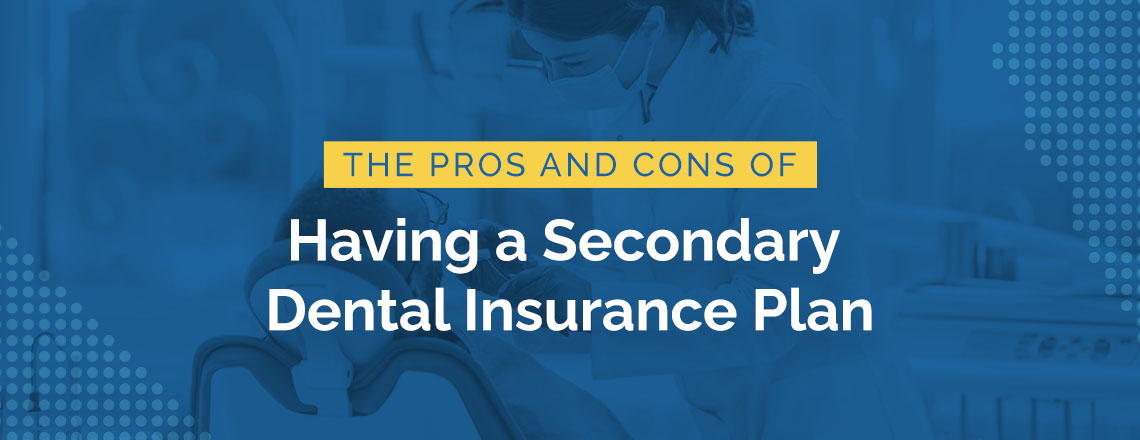The Pros and Cons of Having a Secondary Dental Insurance Plan
Posted: January 08, 2025

A secondary dental insurance plan means two dental insurance plans cover you at once. If two dental insurance plans cover you, you have dual dental coverage or supplemental dental insurance.
This article explains how it’s possible to have coverage from a second dental plan, how it works and how it can benefit you.
Can You Have Two Dental Insurance Plans?
It is possible to have coverage from two dental insurance plans at once. This is called dual coverage or supplemental insurance, and it usually happens in one of three situations:
- You have two jobs, and both provide dental coverage as a benefit, resulting in dual coverage.
- Your spouse has dental coverage through their job, which covers you. You also have your own employer coverage, resulting in dual coverage.
- You already have dental coverage, either through your job or individually. You then decide to take out a supplemental dental plan to add to your coverage.
How Does Secondary Insurance Work?
When you have a secondary dental plan, your two plans will have terms that specify how the coordination of benefits (COB) between them will work. State regulations can also impact COB. Therefore, you must check your policy documents or contact your insurers to clarify the specifics.
However, you will find that one of your coordinating plans is designated as your primary plan and the other as secondary insurance:
- If you have your own coverage and are included in your spouse’s, your own coverage will be primary.
- If you have two of your own employer dental plans, the one that has been covering you for longer is your primary insurance.
If your plans are with two different companies and you claim from both, the secondary carrier usually only pays out after the first. You will need to present them with documentation of the payment information from the primary carrier.
In all cases, the primary and secondary carriers will work together to prevent the total amount paid from exceeding the dentist’s charges.
Therefore, you cannot profit from double benefits by claiming from secondary insurance. The secondary coverage only covers leftover costs for which you have the right to claim.
What Are the Pros and Cons of Having Two Dental Insurance Plans?
Having two dental insurance plans can offer significant benefits. However, you should fully understand how dual or supplemental coverage helps and does not help.
Benefits of Dual or Supplementary Dental Insurance
The advantages of supplemental dental insurance include:
- You could enjoy up to full coverage of your dental expenses when a single plan would only have provided partial coverage.
- You could save money on copayments when the secondary insurance covers part of the outstanding amount.
- You could claim for procedures that the secondary insurance covers but are not included in your primary coverage.
- You could benefit from your secondary coverage even after reaching the annual cap for payments from your primary carrier.
- You could gain added flexibility. For example, you may have more choices of dentists.
Considering the high cost of many dental procedures and the importance of oral health to overall well-being, these benefits could make supplemental dental insurance worthwhile. Having dual coverage through employers is an attractive insurance situation.
Drawbacks of Dual or Supplementary Dental Insurance
While there are significant benefits to supplemental dental insurance, there are a few balancing factors you should keep in mind:
- You will pay premiums on two plans unless at least one is 100% paid by an employer.
- You must familiarize yourself with the COB terms of both policies and how they interact in your state.
- You may need to go through extra steps to claim payments from two carriers rather than one.
- You may receive a lesser payment than you expect or none from the secondary insurance, depending on the claim and COB terms.
Keeping these factors in mind will help you evaluate whether supplemental dental insurance is right for you and avoid disappointment with your dual dental coverage. Remember that you are responsible for any dental expenses not paid by your primary or secondary insurance.
More Secondary Dental Insurance FAQs
If you have lingering questions about supplemental dental insurance, keep reading for help.
Can My Employer Plan Coordinate With My Individual Plan?
Only employer or group dental plans must include COB terms and coordinate your benefits. This typically means your individual plan will not coordinate benefits with your employer plan. Neither will two individual plans from different carriers coordinate benefits.
However, it’s still possible to have dental coverage from your employer and use a supplemental individual plan to pay for care the group plan does not cover. For example, your work plan may exclude braces or root canals, but you may have supplemental coverage for those procedures. In that case, the two plans function as separate primary plans and do not coordinate.
Therefore, there are still benefits to taking supplemental dental coverage as an individual.
How
Does Dual Coverage Work for Children?
Children can also have dual dental coverage. This most commonly happens when both their parents have dental plans that include them as dependents.
Dual or supplemental dental coverage works the same for children as adults, apart from any differences stated in the policy documents. However, the standard ways of distinguishing the primary and secondary carriers are different:
- If the child’s parents share custody, the primary carrier is that of the parent whose birthday is earlier in the year. If parents share the same birthday, the primary carrier is the one that has been insuring a parent for longer.
- If only one parent has legal custody of the child, that parent’s insurer is the child’s primary carrier.
Who Needs to Know About My Dental Plans?
You must inform your dentist’s office about both your dental plans before receiving any treatment or procedure. This helps protect you and your dentist from unintentionally becoming implicated in insurance fraud.
If you intend for your plans to coordinate, you should also ensure the carriers are aware of your two plans.
The Best Supplemental Dental Insurance
The best supplemental dental insurance for you depends on your unique situation, including:
- Your current dental health
- How regularly you expect to need dental care
- Your occupation
- Your dependants
- Your existing dental policy, if you have one
If you reside in California and need more help understanding dual coverage or would like to find your best options for supplemental insurance plans, the Health for California Insurance Center is here to support you.
Health for California is the simplest online service to help you navigate your insurance options and find the best supplemental dental insurance. Our search form is 100% confidential, demands no personal contact details and can be completed in seconds.
Explore free, instant quotes for supplemental dental insurance in California by completing our simple form.
